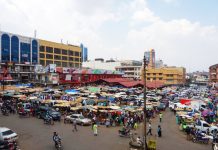Despite rising food prices in the country, the Minister of Agriculture and Rural Development, Dr. Mohammad Abubakar, said on Monday that the country has enough food to feed all Nigerians.
Speaking in Abuja while presenting the ministry’s scorecard for 2015-2023, the minister however blamed the rising cost of basic food stuffs in the country on inflation and the aftermath of the Covid-19 pandemic that forced many countries including Nigeria to shut down key economic activities for many months.
The minister said that while it was not peculiar to Nigeria to import certain categories of foods, the federal ministry of agriculture would continue to produce food to take care of its large population in line with the mandate to do so and improve rural development.
The minister announced that in order to improve food stock in the country, the ministry is currently constructing ten large scale integrated rice mills with 320 metric tonnes capacity per day in Jigawa, Kano, Adamawa, Niger, Kaduna, Gombe, Ekiti, Ogun, Bayelsa and the Federal Capital Territory in addition to supporting the production and distribution of breeder, foundation and certified rice seeds for farmers.
In the same vein, the minister said that presidential fertilizer initiative, which was launched in 2016 has increased the number of fertilizer plants from eight to 200 and raised production from 300,000 metric tonnes to 7 million metric tonnes.
He also blamed the jerk in the prices of fertilizer on inflation and the inability of the producers of raw materials to do so due to the disruption caused by Covid-19.
“The minister said: “We have enough food to take care of Nigerians. We are producing food across the country and we will continue to do so to feed Nigerians in line with our mandate and expedite the transformation of the rural communities of Nigeria.
“The fact that some categories of food are imported by Nigeria is not an indication that we have food shortages. The high cost of food that we experience in the country is as a result of rising inflation, which is not peculiar to Nigeria but due to the Covid-19 pandemic that forced many sectors of economic production to be shut down for many months.
“As it is today, many parts of the world, including our own country are yet to fully recover from the negative effects of the pandemic, which has triggered inflation and high food costs across the world,” he said.
Credit: vanguardngr.com










